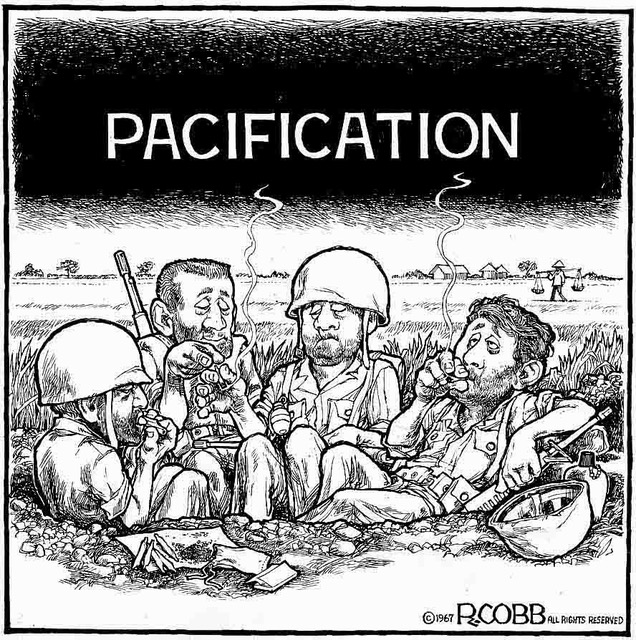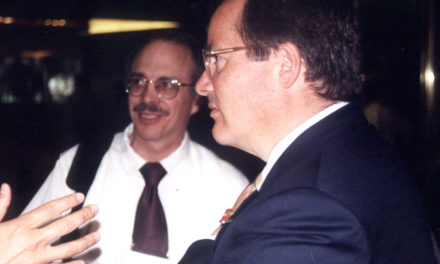Eulogies honoring Daniel Ellsberg as a “whistleblower” are misleading. He didn’t break the news about “our” role in Vietnam to US Americans who had attended a teach-in or read about the war in Ramparts or the Nation or the underground press, or listened to Pacifica radio, or been deployed there and seen the reality. By photocopying and releasing a massive, detailed report on US involvement in Vietnam that had been prepared for Secretary of Defense Robert McNamara, Ellsberg and Anthony Russo risked life imprisonment to document and supplement what millions of us already knew and were saying: that the government had been lying all along, that the US was upholding a corrupt regime, that the insurgents would prevail.
The documents provided by Ellsberg, dubbed “the Pentagon Papers” when published in April ’71 by the New York Times and the Washington Post, are heartbreaking and infuriating. At the end of World War Two, Ho Chi Minh had written eight letters to the White House pledging friendship and asking that the US not support France’s effort to reimpose colonial rule. If Franklin D. Roosevelt had lived for a year beyond the end of World War Two, would he have responded wisely? A big historical if… With Harry Truman in the White House, Ho’s letters were simply ignored. “We” backed the French, who were decisively defeated by the Viet-Minh in 1954 at Dien Bien Phu, where the victors came marching in sandals and the vanquished retreated in tanks.
If you were paying attention back then, you might have heard the whistle being blown by an Australian journalist named Wilfred Burchett whose reports from Vietnam were picked up by the National Guardian, IF Stone’s Weekly, and other leftist publications. In March, 1962 Kathie Amatniek wrote in the Harvard Crimson: “By this time there could be little doubt of Diem’s lack of popular support or the sincerity of his allegiance to any kind of democratic ideal… The US has stuck rigidly to a line of Cold War opportunism… Naturally our support of the French in the name of anti-communism antagonized nationalists of every political hue. Somehow we assumed that the Bao Dai regime, instituted by the French in 1949 to divide and weaken the independence movement, had popular support.” (The Crimson was one of four newspapers read in the White House in the JFK years… In the ’70s Kathie changed her last name to Sarachild.)
Presaging the Pentagon Papers’ chronology of US intervention in Vietnam’s civil war, this “VN Primer” appeared Aboveground, a leaflet/newspaper launched in 1969 by GIs at Fort Carson, Colorado:
DECEMBER 19, 1946—Viet Minh forces throughout Indochina attack French troops. The French-Indochina war begins. Understand that France held Indochina as a colony for years (just as the British held America) and just 26 days prior to the outbreak of the conflict, on November 23, French troops opened fire on the civilian population of Hai Phong killing 6,000.
DECEMBER 23, 1950 United States signs Mutual Defense Assistance Agreement with France, Vietnam, Cambodia, and Laos for indirect US military aid to VN, Cambodia and Laos.
OCTOBER 12, 1952 The 200th US ship carrying military aid arrives in Saigon.
MAY 8, 1954 Despite years of French assurances of impending victory, Dien Bien Phu falls.
MAY 8-JULY 21 1954 Geneva Conference on Indochina. Agreements are signed on July 20 and 21 and the main provisions concerning Vietnam are that (1) Vietnam is to be partitioned along the 17th parallel into North and South Vietnam, (2) regulations are imposed on foreign military bases and personnel and on increased armaments, (3), countrywide elections, leading to the reunification of North and South Vietnam, are to be held on July 20, 1965, and (4) an international control commission (ICC) is to be established to supervise the implementation of the agreements. The United States and Vietnam are not signatories to the agreements. The United States issues unilateral declaration stating that it “will refrain from the threat or the use of force to disturb” the Geneva agreements, “would view any renewal of the aggression in violation of the aforesaid agreements with grave concern,” and “shall continue to seek to achieve unity through free elections, supervised by the UN to ensure that they are conducted fairly.”
OCTOBER 1, 1954 Eisenhower letter to Diem promising “economic assistance.”
FEBRUARY 12, 1955 The US Military Assistance Advisory Group (MAAG) takes over the training of the South Vietnamese Army
FEBRUARY 19, 1955 Talks were scheduled to begin (according to Geneva Agreement) for the preparation of all-Vietnam, elections to be held on July 20, 1956, to reunite the country. The government of South Vietnam rejects the North Vietnamese government’s invitation to discuss the elections, on the grounds that in North Vietnam the people would not be able to express their will freely and that falsified votes in North Vietnam could overrule the votes in South Vietnam.
DECEMBER 12, 1955 US Consulate in Hanoi is closed.
JULY 20, 1956—All-Vietnamese election, as provided in 1965 Geneva declaration, fails to take place. Senator Wayne Morse in a speech at St. Mary’s University, San Antonio, Texas, May 14, 1965, said of the scheduled elections “Undoubtedly, the Viet Minh under Ho Chi Minh would have won such a free election. President Eisenhower declares in his Mandate for Change that all the experts he talked to in that period believed Ho would get at least 80 percent of the vote… Ho was the nationalist patriot of Vietnam who had our favor and our help in WW II when he organized local resistance to the Japanese occupation. Thereafter, he led the resistance to the effort of France to resume its prewar colonial dominion in Indochina.”
The Aboveground “VN Primer” quotes a teach-in speech excerpted in The Viet Nam Reader (edited by Mark Raskin and Bernard Fall):
“America’s failure, of course, to build up an effective government under Diem is now well known, but this was not immediately apparent, for after Geneva his regime enjoyed several years of grace during which Ho Chi Minh’s followers left it pretty much alone. Essentially this was due to the fact that the Geneva Agreements had promised nationwide elections for 1956 and it was primarily because of this provision and because the agreements also stipulated that France would be responsible for carrying out the accords south of the 17th Parallel —and that France would remain there until the elections were held—it was primarly because of those reasons that the Viet-Minh withdrew its armies from the South and for a considerable period suspended revolutionary activity there.
“But with American encouragement Diem refused to permit the elections in 1956 and France washed her hands of the responsibilities which she had assumed at Geneva. Regardless of what sophistry has been employed to demonstrate otherwise, by enouraging Diem to defy this central provision of the Geneva agreements, the United States reneged on the position it had taken there in its own unilateral declaration.
“Civil war in Vietnam became inevitable, for when a military struggle for power ends on the agreed condition that the competition will be transferred to the political level, can the side which violates the agreed conditions legitimately expect that the military struggle will not be resumed?”
“As the editors of The Vietnam Reader state, ‘The Second Indochina War Started on July 2 1 , 1956. On that day, the deadline passed which had been set two years earlier at Geneva for reunification elections to be held between the two zones of Vietnam.”’
In 1964 a leader of Students for a Democratic Society, Clark Kissinger, commissioned a Brecht scholar named Lee Baxandall (who wasn’t in SDS) to produce an antiwar poster to run in the New York subways. Lee, a close friend, roped me in. I wasn’t in SDS either, but I was working at Scientific American and he knew I could get it done. With help from the art director, Jerome Snyder, and the Cambodian mission to the United Nations (in those days you could just walk into the building, there were no metal detectors), I got the poster made. I don’t remember who came up with the wording, but it’s obvious that we considered undermining the Geneva Accords our government’s original sin with respect to Vietnam.
The “VN Primer” in Aboveground was f0llowed by an articleabout the prevalence of marijuana use by GIs in Vietnam (where the anonymous author had done his time). He generalized: “The ‘wet’ culture is comprised of the officers, senior NCOs and a small number of lower ranking EM (enlisted men). The Pot Culture, on the other hand, ecompasses as high as 85 percent of all troops 18-26 years of age, including a number of Officers (mostly company grade).”
The accompanying graphic, Ron Cobb’s brilliant cartoon, “Pacification,” said it all.
In a moving tribute to Ellsberg on substack, his close friend Seymour Hersh recalled that in the early days of their friendship “late at night — we were both night owls — he and I would walk the dog and find time to sit on a curb somewhere and smoke a few Thai sticks. How Dan always managed to have a supply of these joints from Southeast Asia I chose not to ask.”
Why did Sy Hersh, the bravest, coolest, most intrepid and worldly reporter of our time, shy away from asking his close friend Daniel Ellsberg how he obtained marijuana? It’s as if being was a pot partisan ws heavier somehow, even more fraught with danger than having purloined the Pentagon Papers!
It would be interesting to know when and where Ellsberg started smoking the herb and to what extent the absurdity of prohibition accelerated his transition from hawk to dove. During the Vietnam war years there was a strong synergy between the two causes –ending the war and ending marijuana prohibition. Seeing the absurdity and futility of one opened your eyes to the absurdity and futility of the other.
How did the left squander its ownership of the marijuana issue? At the end of the ’60s, instead of fusing to create One Big Movement pursuing our overlapping causes, the peace-loving masses fissioned into a thousand single-issue groups or pursued private solutions. NORML, the National Organization for the Reform of Marijuana Laws, was founded in 1970 with seed money from Hugh Hefner, the publisher of Playboy, an enlightened capitalist. Divorced from their anti-war allies, functioning as Washington lobbyists, NORML welcomed the embrace of Young Americans for Freedom –libertarians and free-marketeers who helped them make cannabis safe for capital.




